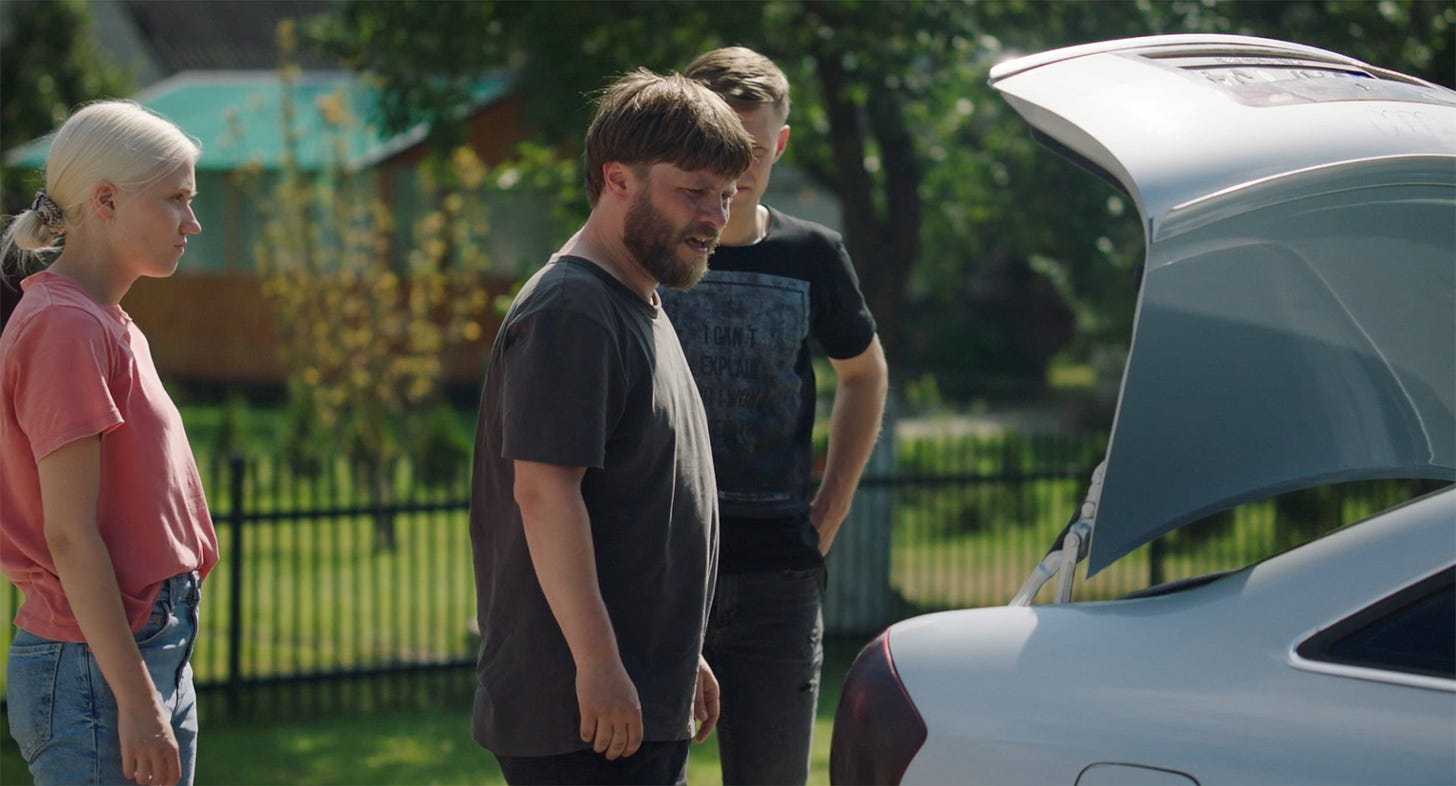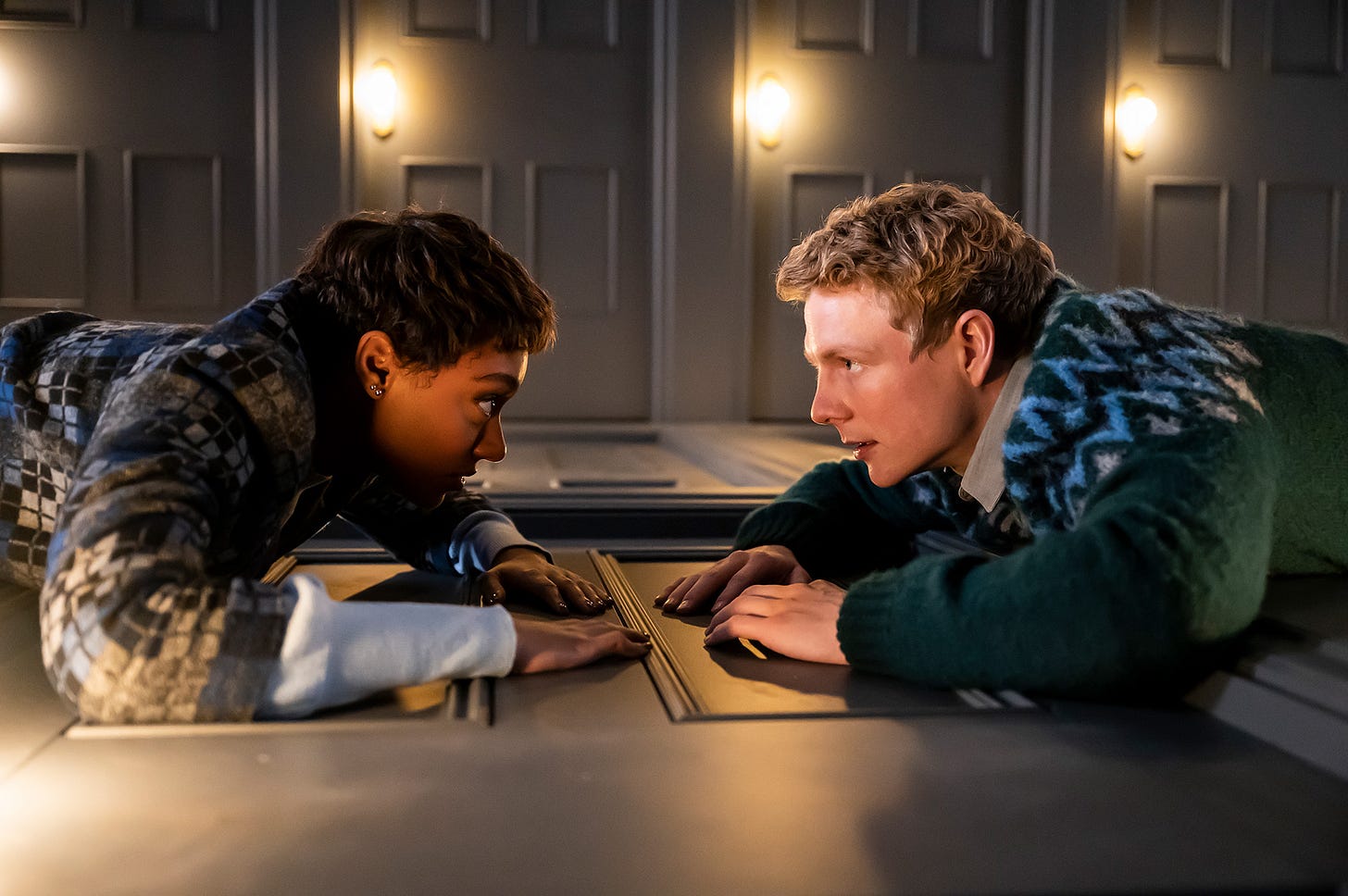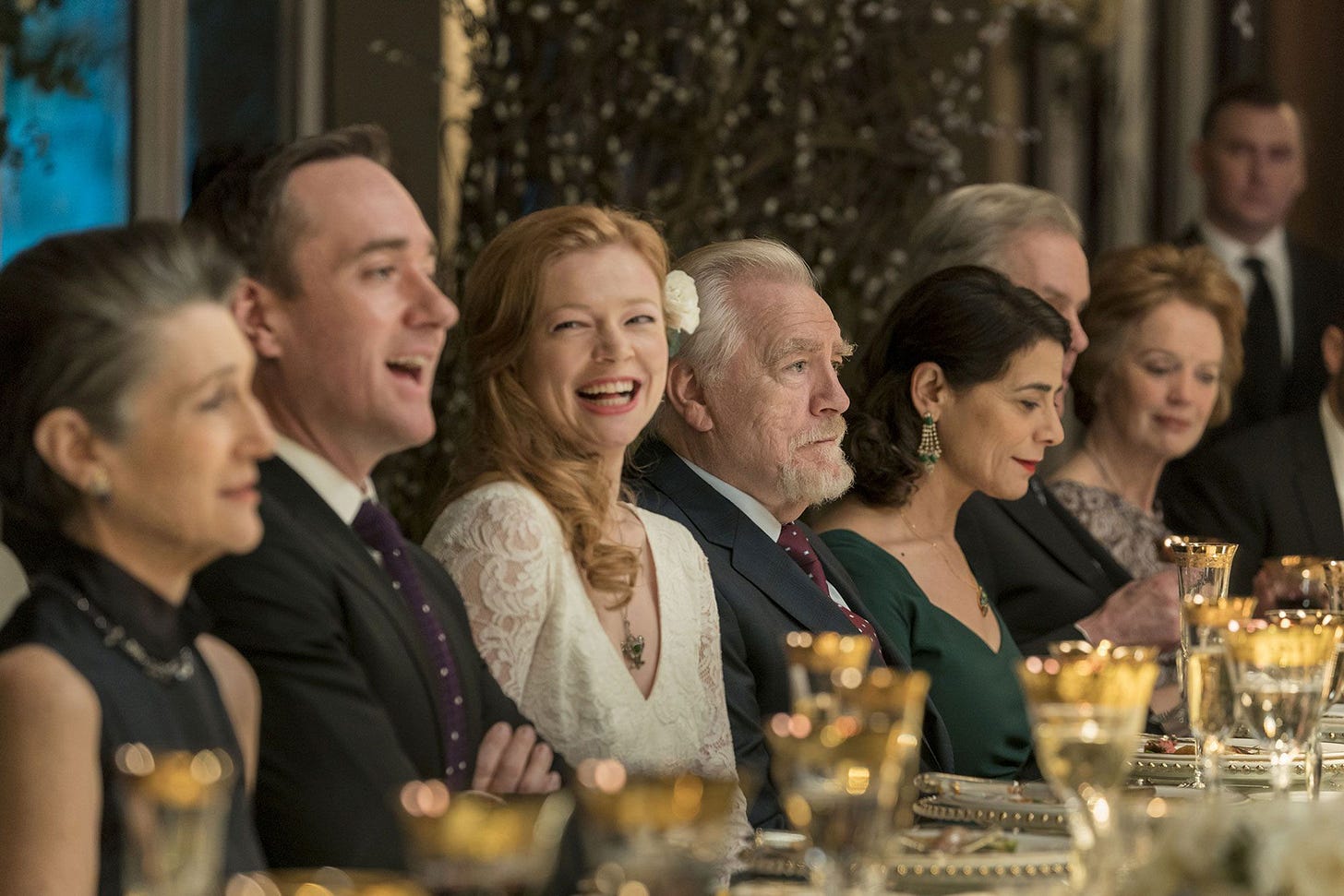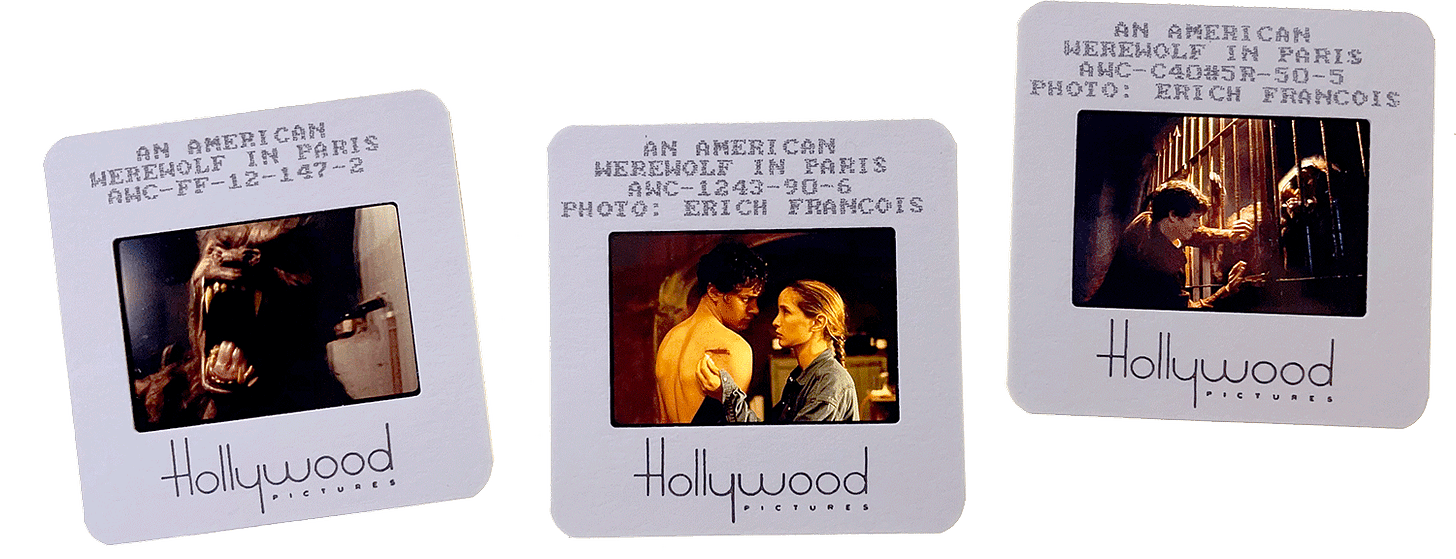Week Ending 4/7/23
Happy Easter
I’m beginning to get overwhelmed with the amount of new TV coming out. After choosing to devote my time to SUCCESSION so that I’m ready for the finale (I’ve never watched the series until now), the return of YELLOWJACKETS and TED LASSO plus the start of RABBIT HOLE, TINY BEAUTIFUL THINGS, BEEF, and more have me wondering how I could ever find the time to catch it all. And the streamers wonder why their growth and profits have stagnated. No offense to creators, but there’s no way all the content hitting TVs and websites is A-plus material. The sheer amount is simply making it so I’m less inclined to find out which are.
Housekeeping: A new month means new Posterized content at The Film Stage. The continued dismantling of Twitter means Substack can no longer embed tweets (they’re “working on it”), so you’ll have to go to the site for your weekly f-bomb hit.
What I Watched:
BOOM! BOOM!: THE WORLD VS. BORIS BECKER
(now streaming on AppleTV+)
I was three years old when Boris Becker won Wimbledon at seventeen, so I never really got to see him play during his heyday. Tennis eventually became a sport I religiously watched in the 1990s, so I wasn’t too late to catch his comeback. I saw him win that second Australian Open and watched some of those matches against Pete Sampras and Andre Agassi. You still saw his mental intensity on the court and his charming demeanor with the press regardless of the time that passed. And you appreciated his decision to retire upon hitting thirty like everyone else (but Agassi) did back then. That’s why it’s so weird seeing my generation continue to play. Serena Williams and Roger Federer are my age (forty). Rafa Nadal and Novak Djokovic aren’t much younger. It’s a different era of athlete and world of sport.
Maybe that’s why Alex Gibney’s BOOM! BOOM!: THE WORLD VS. BORIS BECKER feels somewhat superficial now. I have a mindset where professional athletes in all sports come at their careers from a completely different place than those of generations past. You don’t see as many getting caught in scandals, partying their money away, or skating by on talent alone once dedication to the craft wanes in the wake of celebrity. So, hearing Becker say he wasn’t mature enough or ready enough to adjust a teenage millionaire’s lifestyle to an adulthood devoid of a revenue stream rings somewhat hollow. Yes, it can be rocky and people will take advantage of you, but at a certain point you must learn from previous mistakes. You must buckle down and take responsibility.
To hear Becker talk, he has … to a point. He blames himself. He admits he wronged many of the people who became adversarial to him. But I don’t think he’s ever learned anything from it. As his former manager Ion Tiriac describes him, Boris truly is a kid constantly grabbing for a lit flame to see how close he can get to having it all even when every finger on both hands have already been burned. He’s relentless. He craves the challenge. He agrees that he perhaps threw some sets to put his back against the wall and come out stronger while on the tennis court. That edge sustained him to the point where he’s on-camera saying it would be impossible to find another exciting job post-retirement because nothing would ever match the excitement of Wimbledon’s Centre Court. Well, messy divorces, bankruptcies, secret children, fraud charges, and jail prove exciting too.
Gibney presents his two-part film (“Triumph” is around one-hundred minutes and “Disaster” just under two hours) as a means towards understanding all the personal problems Becker has faced via the lens of his playing career. I think there are obvious parallels, but I’m not so certain there’s much insight when everything pretty much plays out like you’d expect from a once heroic figure of fame and fortune crashing back down to earth. There’s nothing therefore unique insofar as the human element to Boris’ drama. He attached himself to shady people, spent and consumed in excess of his means, and ultimately paid the price. This renders the second half much less captivating for me. Solid storytelling, but straightforward and unsurprising save some anecdotes from the court.
That’s why I enjoyed the first half a lot: it’s pretty much all tennis anecdotes. Björn Borg, John McEnroe, Nick Bollettieri, Michael Stich—they have the insight into who their competitor / friend / student was. So too does Becker’s first wife Barbara. To be able to focus on just Boris, Barbara, and a couple other people while dipping our toes into this tumultuous life and drive to be independent makes everything hit harder. And that includes the tease of jail time and chaos before meeting the other women, business partners, and Novak Djokovic (who Boris coached for a couple years, potentially being the voice that finally got him over the psychological hump to now be tied for the most Grand Slam victories in men’s tennis history). Becker is never more lucid and engaging then when speaking on his career.
The rest is for show. Even Gibney admits it with narration cutting in to mention how the words Boris just spoke aren’t entirely true. And that’s okay. That side of this story—when Becker is often lying to himself—is really fascinating. I’m just not sure Gibney ever digs deep enough to get something out of it. Not that he necessarily must considering “Triumph” succeeds on entertainment value alone with its biography approach. Maybe it’s the fact that we’re led to believe more is coming in “Disaster” that’s the issue because it too is just biography. Details in chronological order with no real commentary beyond Boris saying he’ll “accept whatever happens” regardless of “fairness.” But that tone of taking his woe-is-me punches “like a man” never gets called out either. BOOM! BOOM! proves an enjoyable puff piece as a result. It touches on the messier points of the tennis great’s life, but only to admit they occurred.
- 6/10
LEDA
(hits VOD/Digital HD on 4/11)
Depicted in countless works of art, Leda and the Swan find their way to cinema via writer/director Samuel Tressler IV and painter Wesley Pastorfield. LEDA is a short (75-minutes) black and white visual poem without dialogue that follows the titular character (Adeline Thery) as her mind gets lost to the past (the love and death of her parents) and present (a wedding, pregnancy, and murder) while dealing with the psychological and emotional turmoil caused by impending motherhood. Björn Magnusson’s score and Nick Midwig gorgeous cinematography become the backbone upon which this Greek myth of eroticism and rape projects its modern (although period specific) sense of distress. Images of eggs floating in the forest and decomposing animals deliver a nightmarish contrast as visual beauty unearths the violent grotesquery beneath.
Mileage will obviously vary as the slow pacing paired with zero words makes for a trying experience to those with short attention spans. Even I struggled at times despite finding the whole consistently engaging as it moves between childhood, grief, love, and despair. Knowing the origins of the tale will surely help in processing what occurs on-screen, but it’s not necessarily crucial insofar as understanding the gist of things. Once the screen flickers turn swan to man, you can get a sense of the mental detachment from reality that ensues for Leda—awakening on the forest floor without knowing how she got there thanks to dreams calling her into the night. Whether the swan is Zeus or her husband or a stranger becomes irrelevant since the crime itself remains unforgivable regardless of the perpetrator’s identity (if a crime is committed since the whole could be construed as being about pregnancy in general too).
It’s definitely not the sort of thing you’d want to walk into blind off the street, but those already interested in Greek mythology and poetically abstract films should at least appreciate the effort if not the whole package. There are some truly memorable moments (leaves/feathers “falling” upward as Leda stares into the camera) and an unforgettably dark climax turning to color as the cries of a baby can be heard in the distance that make any lulls seem a distant memory of our own as a result. Thery bares her soul with an ever-present wealth of anguish, desperately seeking to find an internal balance with which her situation simply can’t comply. The supporting cast is effective too in bit parts on the fringes, each giving context to Leda’s mindset rather than building characters all their own. It’s an experimental art piece giving voice to trauma that demands the viewer’s participation to fully succeed.
- 6/10
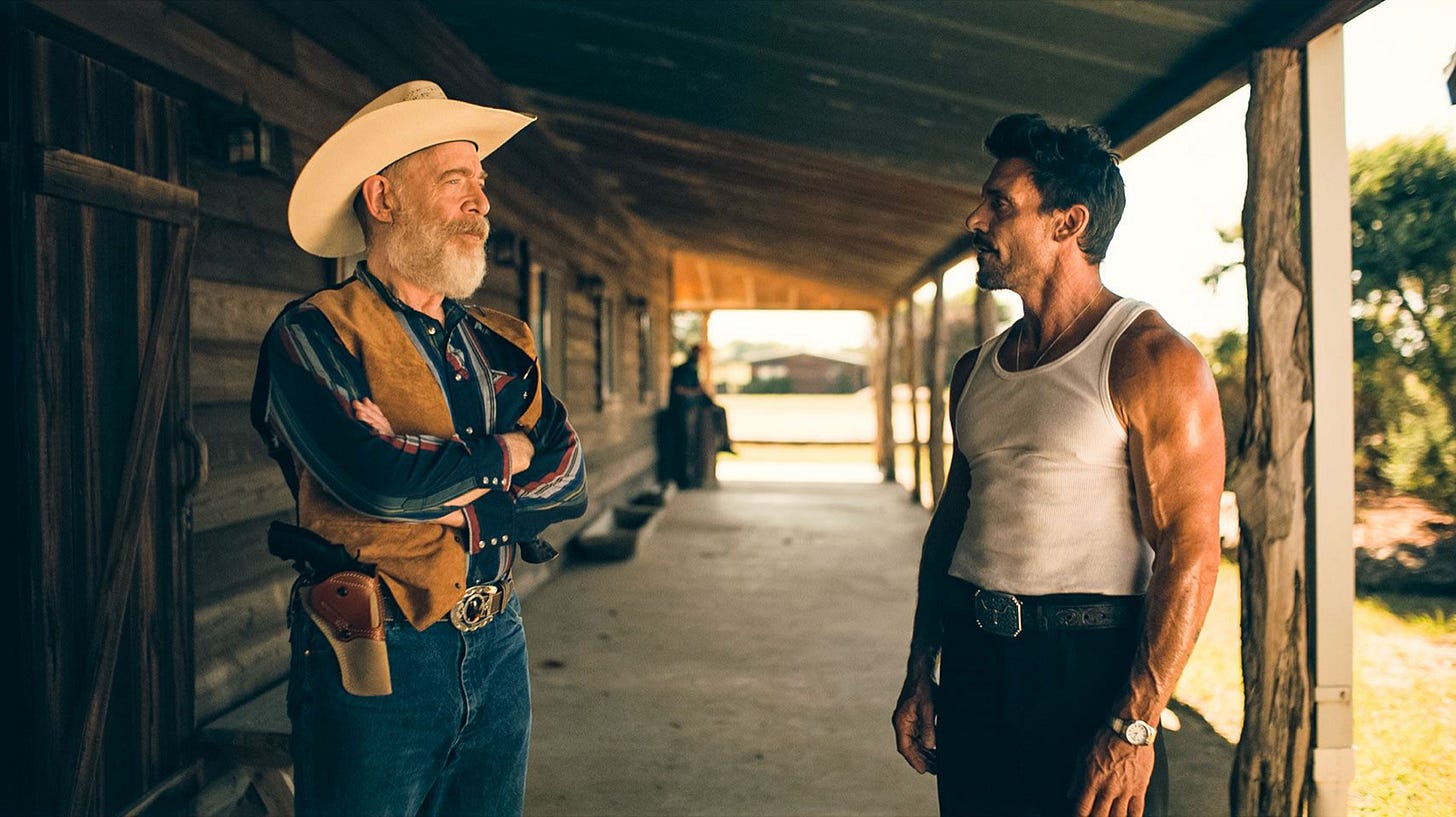
ONE DAY AS A LION
(now in limited release and on VOD/Digital HD)
We’re four months into 2023 and I’ve already seen two new John Swab films (with a third, CANDY LAND, I’ve yet to catch). That’s a prolific year for the indie director and, in my opinion, a successful one too considering my mixed enjoyment for LITTLE DIXIE and now my enthusiastic enjoyment for ONE DAY AS A LION. The latter may have similar issues where genre and budget are concerned narratively speaking, but the fun factor cannot be undervalued. Scott Caan has written an entertaining bunch of characters ranging from egomaniacal cowboys to New York criminals losing their edge to a life-long screw-up willing to perform the dumbest act of his life in order to protect his teenage son. It leads to a lot of comical verbal pissing contests and, perhaps surprisingly, a lot of heart.
Jackie (Caan) is introduced crying in his car because of what he’s agreed to do. Broke and desperate to hire a lawyer so Billy (Dash Melrose) doesn’t get lost to the juvenile detention system that he did growing up, his old friend Dom (George Carroll) proves the only lifeline at his disposal. If Jackie kills Walter Boggs (J.K. Simmons), a man who owes one hundred large to Dom’s crime boss Pauly (Frank Grillo), they’ll pay for the attorney. The problem, of course, is that Jackie isn’t a bad guy. He got out early enough thanks to a middling boxing career and never had to risk doing hard time. So, he decides to open his mouth instead of pulling the trigger. He lets Walter know who sent him, accidentally shoots a bystander in the head, and takes the only witness (Marianne Rendón’s Lola) hostage.
The ensuing mess separates into two threads: Jackie trying to stay alive while Dom pursues him as Lola looks to help (with the prospect of her rich mother’s money, as played by Virginia Madsen) and Pauly trying to salvage his reputation either by getting the money Walter owes or killing him himself. The first is where the film shines as we get to know Jackie and Lola as flawed yet empathetic souls believing they can scratch each other’s backs and save Billy in the process. The second drags a bit since Walter was always a means to an end where making Jackie’s life forfeit is concerned. We don’t actually care about his or Pauly’s fate. If not for the laughs earned whenever Grillo and Carroll are sitting at a table together, I’d argue the value of this subplot isn’t worth the time away from the leads.
In the end, they’re as disposable to the whole as the mothers who are conversely given one or two scenes to shine before disappearing (Madsen and Taryn Manning as Billy’s mom). That’s not to say Simmons and Grillo as polar opposites when it comes to country rancher and big city shot caller isn’t effective. It’s simply unnecessary past the opening few scenes. The real intrigue lies in Jackie’s race against time to help his son and Dom’s conflicting motivations where it comes to needing to kill his friend out of duty and not wanting to out of loyalty. Lola is a bit of a third wheel in that sense, but not when it comes to investing in the journey since we’re learning about Jackie’s own genuine motives as she does—Bob’s (Bruce Davis) untimely and easily forgotten demise notwithstanding. Watching those two willingly give the other a belief they’ve never received before is everything.
- 7/10
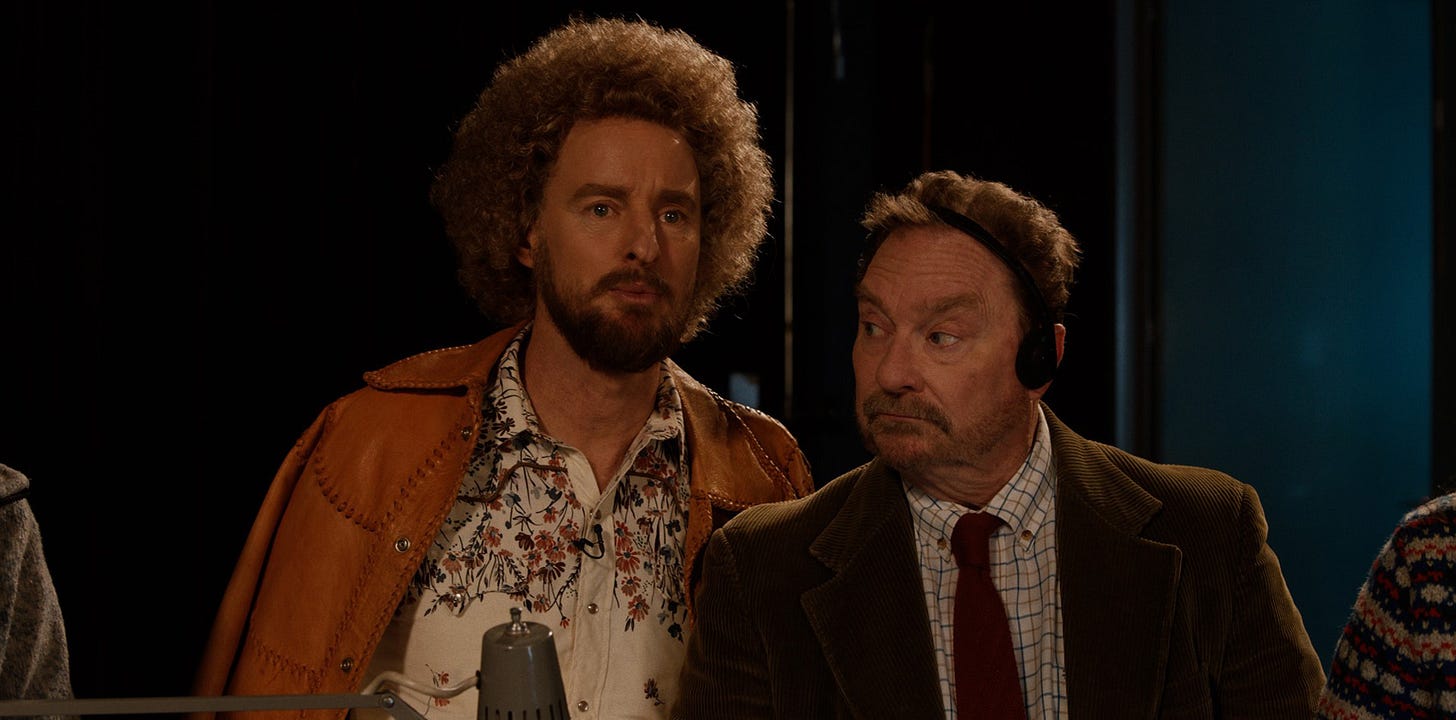
PAINT
(now in theaters)
Get ready for a ton of headlines akin to “Like watching PAINT dry” because Brit McAdams’ PAINT is quite the slow burn. Think Wes Anderson by way of Jody Hill—a marriage that will surely work for some, but did not for me. Because it’s not quirky enough to exist solely on its aesthetic. And it’s not darkly deadpan enough to warrant the awkward pauses and discomfort. It’s simple a story about a sexist PBS painter styled after Bob Ross who lets fame sabotage his relationship, fear sabotage his talent, and ambivalence sabotage his career. Carl Nargle (Owen Wilson) had it all and squandered everything to hit rock bottom and find the self-awareness to pick himself back up and remember what the empty words he spoke to Vermont’s loyal viewers every weekday truly meant.
Flashbacks situate us inside the workplace dynamics pretty early on as every woman who works at Tony’s (Stephen Root) station fawns over Carl besides assistant producer Katherine (Michaela Watkins). Why? Because they used to go out and probably still love each other despite her focus now being centered on saving the station (and escaping to Albany to run her own PBS) and his on the unexplainable sex appeal his only-paints-Mount-Mansfield, ASMR-adjacent celebrity possesses. So, while he huffs his own flammable fumes, she looks to bring the ratings back to profitability before saying goodbye. That means hiring a younger artist (Ciara Renée’s Ambrosia) for friendly competition and transforming Carl’s hefty salary into a severance package once syndication renders his needing to do more live shows obsolete.
A reductive rivalry ensues with sexual fluidity and “killing things with kindness” attitudes softening the blow of any potential drama that could actually go somewhere beyond this sleepy town’s borders. It’s all noise to remind Carl and Katherine of what they once had while proving how easy it is to villainize a woman for daring to have sex outside of a monogamous coupling when you’re pretending like a man who does everything but is fine. The whole becomes a very long and winding road towards clarity for Carl (Wilson is pretty much playing a watered-down version of Eli Cash from THE ROYAL TENENBAUMS) so that he can finally forgive Katherine’s transgression while she’s forced to eat guilt and ignore his own while waiting for him to finish. Add some ageist gags with lazy art world commentary and the whole feels like one of Nargle’s paintings: a hollow, passionless canvas fit for a Motel 6. (McAdams’ words, not mine.)
- 5/10
PILGRIMS [Piligrimai]
(now in limited release; Lithuania’s International Oscar submission)
I can see a lot of people getting very frustrated very fast with Laurynas Bareisa’s feature debut PILGRIMS. We are brought into the action with zero context as Indre (Gabija Bargailaite) waits outside Paulius’ (Giedrius Kiela) parents’ home—where he’s recently moved back in. They haven’t seen each other for a while. She chides him about maybe having a girlfriend. He says his mother is sleeping when she asks to say “Hello” only for her to appear soon after to walk the dogs and spark a reunion without giving us anything more to chew on beyond hypotheses. Did these two used to go out and he’s embarrassed? Why are they coming back together now and what are they planning to do on this road trip? Their first destination does little to shed light.
If anything, that initial stop confuses things more being that they are trespassing on property where someone was apparently locked in a basement. They eventually begin roaming around a restaurant too—Indre silent as Paulius points out tables and corners where his matter-of-fact story about an altercation turning tragic took place. Was he there? Was he involved? Who is the victim to them? Bareisa is ratcheting up the suspense by allowing these two old friends to numbly walk through places that are haunted by the memory of someone’s ghost. But the more we hear and the longer they stay, it becomes clear that their numbness isn’t a product of indifference. It’s born from rage and pain and sorrow. These two are grieving someone they loved. They’re trying to understand the incomprehensible and, perhaps, seek some form of revenge or release.
Paulius is ready to kill someone. Indre is ready to feel. He can’t stop scowling when those complicit in what happened dare to express some level of privacy or empathy and she can’t stop smiling. It’s a truly authentic depiction of the awkwardness inherent to dark subject matter—especially since what they are doing isn’t necessarily “normal” when you consider a trial was conducted and the perpetrator found guilty. What does retracing these steps truly provide that the closure of that justice didn’t? Half of it is to hear the truth from the people who were there. Half of it is to acknowledge those steps so many years later in order to confirm that the deceased hasn’t been forgotten no matter how far Indre and Paulius have moved on. This is a film about the psychological scars of places, objects, and people.
And it doesn’t shy away from the complexity of those scars extending beyond just the victims’ loved ones. The perpetrator’s family has suffered loss too. That doesn’t mean you have to pity them or pretend their anguish is on par with our leads, but it does color their motivations when asked to relive what happened through force rather than choice. So, don’t expect the sort of catharsis Hollywood loves to put on-screen via guttural screams and acts of righteous violence. This is more about crying under a sheet on the floor or refusing to be comforted. It’s about losing your head and damaging property only to eventually apologize. I’m talking about mundane melancholy, poked and prodded by a mixture of fear and indignation where nothing tangible results besides a long-awaited exhale of acceptance.
- 8/10
THE PORTABLE DOOR
(streaming on MGM+ 4/8)
En route to a barista interview in hopes of securing a job that will allow him to pay the half of the rent his roommate has neglected to supply, Paul Carpenter (Patrick Gibson) cannot help but get waylaid. First, it’s burnt toast and broken shoelaces. Then it’s strangers stopping him in the street and a dog stealing his scarf. The next thing he knows, Paul is standing in front of a door that says nothing but “Applicants” on it. So, he walks in. Ignorant to the place and the job, he sits on the waiting room couch only to be called by name by Mr. Tanner (Sam Neill). Off he goes to meet the board of J.W. Wells—headed by Humphrey Wells (Christoph Waltz) and rounded out with characters played by Miranda Otto, Rachel House, and Chris Pang. The coincidences that brought him intrigue them. He starts working for them the next day.
We enter the world of Tom Holt’s book series alongside Paul as he walks into the Wells building despite still knowing nothing of what is in store. Director Jeffrey Walker and screenwriter Leon Ford’s THE PORTABLE DOOR moves us from unfinished construction sites to immaculate lobbies with employees who always seem to know more than they should (Jessica De Gouw’s Rosie) and oddities that cannot be easily explained (staplers that conjure extreme emotions on both sides of the fear-to-love spectrum, rooms of dot matrix printers and pneumatic tubes, and secret closets for “Goblins Only”). It’s there that Paul and his fellow intern Sophie (Sophie Wilde) begin to understand their as yet untapped magical powers as well as whom amongst upper management has their backs.
The film is a briskly paced adventure that balances the excitement of the main thrust (finding Humphrey’s lost portable door) and the intrigue of the underlying mythology well. There’s a lot of subterfuge as far as who to trust thanks to everyone being a bit scatterbrained and busy, but never enough to make subsequent rug pulls more than fun expository revelations. The whole feels like previous Jim Henson production THE WITCHES (the 1990 version) in this way with hidden agendas coming to light around the midway point so we know the difference between good and bad if not the complexities separating the coerced from the evil coercers. Practical creature effects are married with computer generated magic as fantasy horror collides with wholesome young romance under a comedically family-friendly umbrella.
Both Gibson and Wilde prove wonderfully endearing leads—awkward Paul and confident Sophie discovering who they are, what they want, and how they’ve been manipulated thanks to weird assignments, weirder bosses (Neill, House, and Waltz delight), and the infinite power of a door that leads everywhere. It’s just twisty enough to keep adults invested while remaining silly enough to hold the attention of any children too. We want to see what it is that’s really going on and how far the villains pulling strings will go to profit off the skills J.W. Wells has provided for millennia as a silent partner thus far uninterested in credit. And like so many young adult fantasies, it’s the unwitting new guard who come in with the potential of foiling the dastardliest of plans with kind hearts and courageous love.
- 7/10
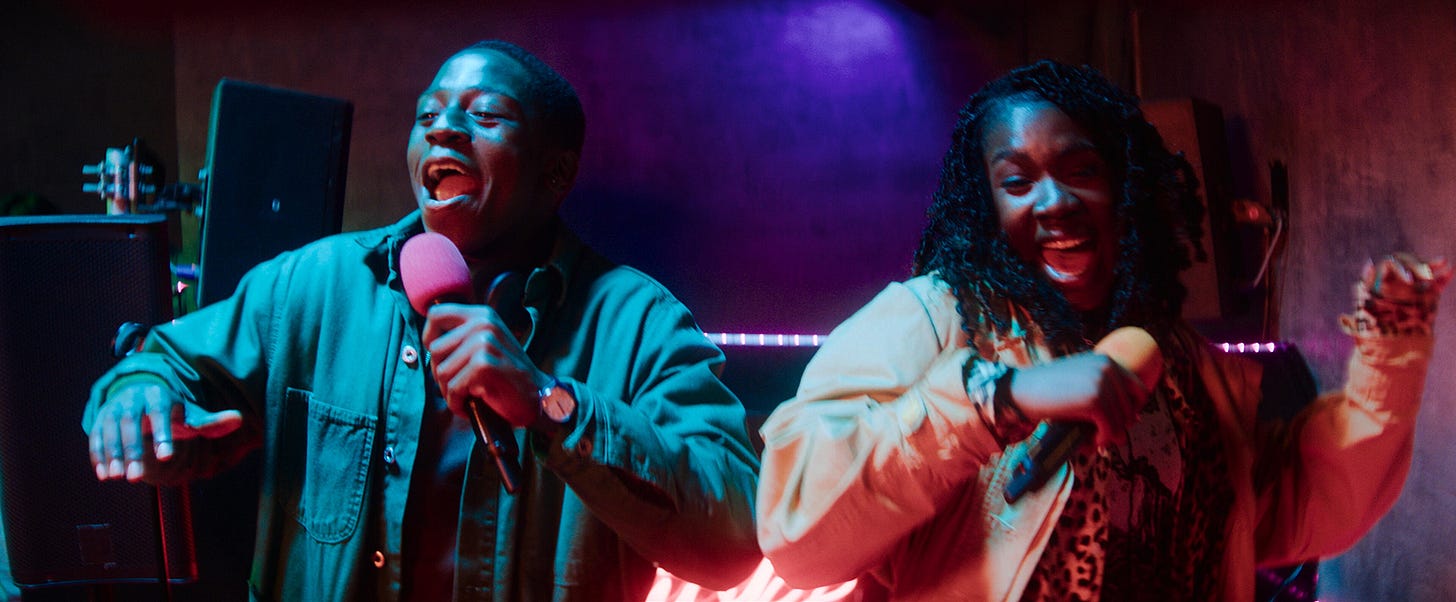
RYE LANE
(now streaming on Hulu)
I haven’t seen TRAMPS since it played TIFF many years ago, but its sense of unbridled quirky rom-com energy and spontaneity is the first thing that came to mind while watching Raine Allen-Miller’s RYE LANE. The lead characters ooze chemistry as their journey through South London twists and turns from exaggerated anecdotal memories of past love to clandestine adventures that bounce around karaoke clubs, backyard barbecues, and a microwave-ready dinner from Mom. So, of course it all starts at a gallery show populated by photographs of mouths with a tearful Dom (David Jonsson) trying to compose himself in the unisex bathroom as Yas (Vivian Oparah) sits down to pee in the next stall. It’s the sort of meet-cute you hope to forget with the person you hope you won’t.
While you must credit Nathan Bryon and Tom Melia for their exhilaratingly witty script, so much of its success relies upon Allen-Miller’s visual style (fisheye pans, widescreen compositions, and unforgettable background players like a bare-chested man hanging out his window or a dude chowing down on the bus) and Jonsson and Oparah’s impeccable rapport. The latter is so natural that I wouldn’t have been surprised to find them also credited as writers due to the whole playing like one long riff session with stories of broken hearts and impromptu jealousy-fueled sabotage. They’re wearing their emotions on their sleeves whether through their words or body language. Dom is the self-immolating type getting excited with awe about everything Yas does while she guards her insecurities with a brave face she wishes was more than a defensive façade.
They become the people they wish they were while together. Unencumbered by a shared history and game to see where lofty ambition might take them if only they allowed themselves to throw caution to the wind, the unadulterated playfulness and heightened state of personality adopted makes it so that they reach joyous highs they’ve never yet experienced. But that also means they must eventually come down. And while this romance does—at the usual narrative pivot point, no less—it doesn’t feel false. This fairy tale of flirtation inevitably bleeds into their real lives, allowing conservative impulses to take over. Because what’s actually happening? How much of this is true and how much a product of the social invincibility their unexpected lark of a day has imbued within them?
The film looks great and sounds even better with a fantastic soundtrack (Salt-N-Pepa karaoke, Tribe Called Quest power fantasies, a funny yet heartfelt rendition of Sananda Maitreya’s “Sign Your Name”, and a Sampha/Tirzah collaboration at the end credits). The supporting cast is fully on-board (Benjamin Sarpong-Broni’s goofball Eric is a highlight) with a jaw-droppingly unexpected yet unflashy A-list cameo possessed by exquisitely deadpan timing to boot. And with charm to spare, the story is able to touch upon more serious subject matter (self-esteem, maturity, heartache) without losing the ability to swiftly pivot back to the comedy since the characters are never so oblivious to ignore their own failings in a given situation. Because Dom and Yas aren’t perfect. They get so wrapped up in the image they yearn to project that they don’t initially realize it comes naturally together.
- 8/10
SUCCESSION: Season 1
No matter how entertained I was during the entirety of the first season of Jesse Armstrong’s SUCCESSION, I can’t shake just how disappointing the finale proves. The whole trajectory is setting up a showdown between father (Brian Cox’s Murdoch-esque billionaire Logan Roy) and son (Jeremy Strong’s kicked puppy of a new wave CEO Kendall Roy) only to derail everything at the eleventh hour with a dramatic development fit for daytime soaps. These are great characters with true intrigue in the contrast of their leadership styles—culturally and generationally—that flirt with all-out war three separate times only for Lucy to pull the football again. And while we initially believe Kendall is Charlie Brown, we eventually discover it’s actually us.
That’s not to say the whole thing fails. I had a blast watching and look forward to continuing in the hopes Armstrong and company won’t just keep laughing at us while we laugh at the nightmarish capitalist monsters he’s created. Because their insecurities and faulty confidence are an absolute joy to experience. All it takes is one look from Logan for Kendall, Roman (Kieran Culkin), Shiv (Sarah Snook), and Connor (Alan Ruck) to suddenly lower their eyes and clam up into the little children they are beneath his massive shadow. They love to band together and single out the eldest for being an eccentric living in a fantasy world with zero self-awareness, but, while that’s exactly what Connor is, none of them are much better. The others may even be worse because of it.
Shiv’s subplot as the fixer for a democratic hopeful for President is great because it helps make Logan look even more villainous than he does on his own while also exposing the truth of her motivations to be just like him in a venue that puts her in direct opposition (Snook is fantastic, her steely indignant demeanor given its payoff with a moment of uncharacteristic vulnerability in the finale). Roman’s thread is much less meaty since his flaky nepo baby is superficiality incarnate, but Culkin has his moments whenever given the opportunity to whine for praise and prove how afraid he is. Kendall is the focal point: the heir apparent who’s thwarted every time it seems his moment has arisen. Strong steals the show as a result, both the “good guy” saddled with the Roy reputation and just as ruthless. He’s therefore just as unsympathetic as the rest, yet we want him to win.
At least we do until the end. Before the script cuts off his legs and renders his tenuous control of his own fate nonexistent. I get that this endgame builds from a long con that starts with fake news stories about his drug addiction, but always making him fall prey to the noise feels narratively lazy even if his actions make the familial dynamic pop. That’s the tricky balance. It’s a character piece held together by a messy battlefield of in-fighting, jealousies, and betrayals that captivate enough without constantly adding more drama via ham-fisted and over-the-top tragedies. The show is at its best when these monsters are in a room together calling out each other’s bullshit. Undercutting that with rich-kids-needing-to-be-bailed-out-by-their-powerful-father blackmail gets boring fast. Don’t tease a teeth-bared, claws-out war and say, “Gotcha!” Because it isn’t delayed here. It’s cancelled.
All that said, “Austerlitz” is an all-timer. “Which Side Are You On?” and “Prague” aren’t far behind. The main cast is impeccable and the supporting players may even be better since they still get to hold some cards. Matthew Macfadyen as Shiv’s fiancé Tom might be the most fascinating character of all (doesn’t come from money, is seen as soft and genial by the family, can be cutthroat when pushed and in a position to whip someone else like the Roys whip him). Nicholas Braun’s Cousin Greg is always watching in the background, accruing capital by way of loyalty and blackmail fodder despite his goofball demeanor. And Hiam Abbass is an absolute enigma as Logan’s current wife and devil on his shoulder. I can’t wait to see what happens with her Marcia as things progress.
Special mention to Rob Yang and Natalie Gold’s agents too. I think he’s in less than half the episodes for barely five to ten minutes each and she’s in more than half for the same, but they’ve got their names in the opening credits. Both are great, but I don’t understand how they get top billing over J. Smith-Cameron whose chief counsel earns more time and contextual weight than both.
- 7/10
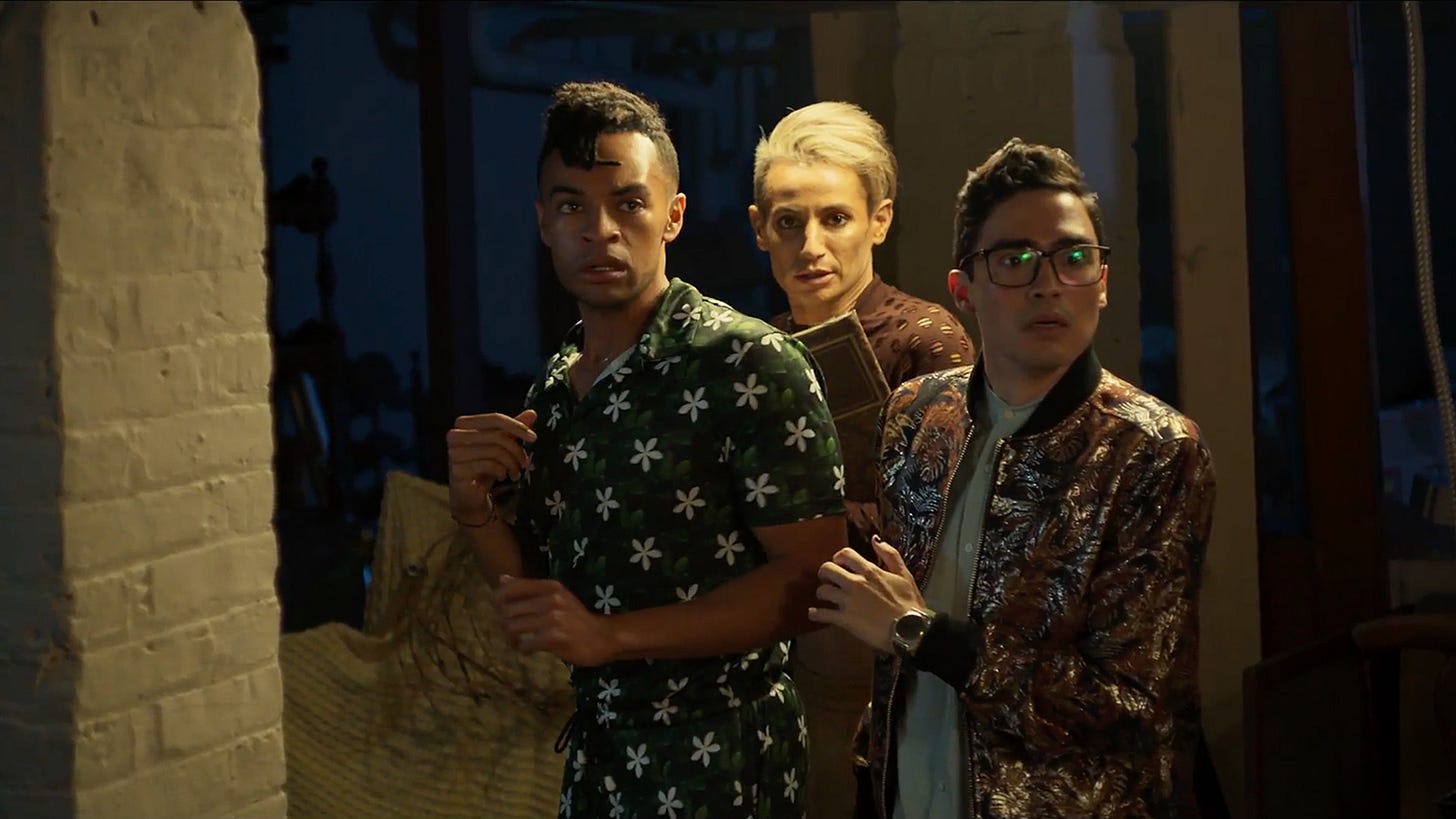
SUMMONING SYLVIA
(now on VOD/Digital HD)
Despite already being committed to going tuxedo shopping with his soon-to-be brother-in-law (Nicholas Logan’s Harrison), you can’t blame Larry (Travis Coles) for letting it slip his mind once his three best friends (Frankie Grande’s Nico, Troy Iwata’s Reggie, and Noah J. Ricketts’ Kevin) kidnap and blindfold him en route to his surprise bachelor party. Once the excitement hits, singing begins, and spooky tales of haunted spirits are revealed, all Larry cares about is partaking in a séance and crossing activities off Reggie’s extensive weekend schedule. The catch is that no one told his fiancé (Michael Urie’s Jamie) knowing he’d inevitably spill the beans. So, while calling to let him know he was okay, Larry is suddenly reminded of that previous obligation. Desperate to not ruin the party or sour an already rocky relationship with Harrison, he invites him to join them.
His on-the-wagon, toxically heterosexual, military veteran proves the final piece to Wesley Taylor and Alex Wyse’s comic horror SUMMONING SYLVIA. Harrison is the last thing any of these men want ruining their fun because the point of the getaway is to have the freedom to be themselves in a safe space devoid of homophobia. And while begrudgingly agreeing to attend this bachelor party for his brother’s sake seemed harmless, knocking on the door to see four unapologetically gay men turns a chore into a nightmare for Harrison. Add banging walls and falsetto humming and Larry and company suddenly fear they really brought Sylvia (Veanne Cox’s son-killing, murdered original homeowner) back to life. Kevin screams, Harrison battles PTSD, and Nico excitedly hopes to interact with ghosts.
It’s a fast-paced (74-minutes) ride including an extremely unsubtle game of “Never Have I Ever” and a sexual encounter with an unwitting yet awakened “spirit.” There are easy jokes insofar as having the straightest man ever thrown into a room of flamboyant revelers, but also poignant moments dealing with shame (Larry wiping off his make-up and dialing down his “gayness” to compromise for his guest) and empowerment (the truth of Sylvia and her son becoming a heartfelt mirror on acceptance and sacrifice). By allowing preconceptions and lies to dictate these situations rather than open conversation, the friction builds out of control in a self-perpetuating cycle of perceived bigotry. Looks can be deceiving, though. Protection can appear like animosity through an already tinted lens.
Taylor and Wyse pull no punches dialing things to eleven with secret trysts, mob mentality, betrayals, and drag as Coles, Grande, Iwata, and Ricketts have a blast with a pervasively snarky streak. Logan plays a good straight man (both definitions), simultaneously being someone for them to fear and attack in equal measure. The parallels to the past with living flashbacks and a gradual reveal of the facts help propel the narrative forward while also providing fodder for more hijinks once the possibility of ghosts gets everyone’s minds racing to hilarious ends. Cue the pizza boy and the terrified groom rushing to diffuse what he can only imagine has devolved into disaster and it becomes impossible not to give the film your full attention. With zero lulls and a heavy air of homicidal potential, it becomes a race to see whether the dead will rise before the living impulsively murder each other.
- 7/10
New Releases This Week:
(Review links where applicable)
Opening Buffalo-area theaters 4/7/23 -
A DIFFICULT LIFE at North Park Theatre
PAINT at Regal Elmwood, Transit, Galleria & Quaker
RAVANASURA at Regal Elmwood & Transit
WHAT THE HELL HAPPENED TO BLOOD, SWEAT & TEARS at Dipson Amherst (one night only, 4/7 at 7:05pm)
Streaming from 4/7/23 -
CHUPA - Netflix on 4/7
GANG OF LAGOS - Prime on 4/7
OH BELINDA - Netflix on 4/7
ON A WING AND A PRAYER - Prime on 4/7
PRAISE THIS - Peacock on 4/7
HUNGER - Netflix on 4/8
THE PORTABLE DOOR - MGM+ on 4/8
Thoughts are above.
OPERATION NATION - Netflix on 4/12
THE PLAINS - MUBI on 4/12
Now on VOD/Digital HD -
THE AMAZING MAURICE (4/4)
“It's a fast-paced adventure bouncing back and forth between vantage points and devices to keep the jokes loose and the danger light. The film stumbles at times and is definitely convoluted, but it also just plain works.” – Full thoughts at HHYS.
CHRISSY JUDY (4/4)
COUNTRY GOLD (4/4)
“This thing has the makings of a real warts-and-all two-hander where the filmmaker can therapeutically exorcize his demons, but that all seems to play second fiddle to the desire for distractingly unorthodox and absurdist segues.” – Full thoughts at The Film Stage.
EL HOUB (4/4)
INSIDE (4/4)
JUNIPER (4/4)
“[A] poignant film centering the psychological toll of difficult lives rather than the goal to ease their pain. That exists too, but as a byproduct of their strength to deconstruct the games society often demands we play in lieu of confronting the truth.” – Full thoughts at HHYS.
LIVING WITH CHUCKY (4/4)
MEET CUTE (4/4)
THE QUIET GIRL (4/4)
“It's a subdued drama that allows us to sit with the characters as they sit with each other. This story doesn't need gimmicks when a perfectly executed example of narrative mirroring is enough to express love via a hug.” – Full thoughts at HHYS.
A RADIANT GIRL (4/4)
UNICORN WARS (4/4)
“It's also an unforgettable R-rated animated experience that metaphorically tells mankind's own mythological tales under the guise of cutesy characters to truly get to the heart of how absurd our generations of hostility and bloodshed have always been.” – Full thoughts at HHYS.
ONE DAY AS A LION (4/7)
Thoughts are above.
SUMMONING SILVIA (4/7)
THE YEAR OF THE DOG (4/7)





